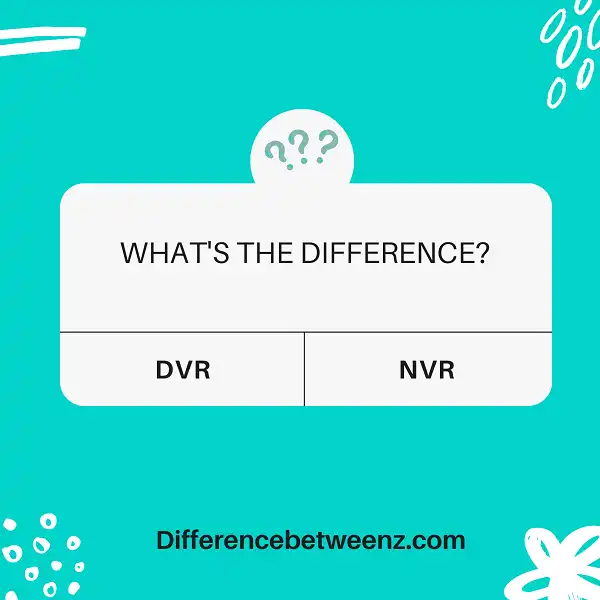Digital video recorders (DVRs) and network video recorders (NVRs) are both useful tools in the realm of security camera systems. However, there are some key distinctions between these two types of recorders, making it important to become familiar with their individual features and benefits before selecting a system for your business or home surveillance needs. In this blog post, we’ll take a look at what separates DVRs from NVRs so you can make an informed decision on which product is right for you. Read on to find out more about DVR vs NVR!
What is DVR?
- DVR stands for Digital Video Recorder and is an important innovation that has made home entertainment more convenient. It is a device used to record television shows, movies, commercials, and other video signals in digital format onto disk drives or other storage devices.
- DVRs have revolutionized the way we watch our favorite shows by allowing us to record them, store them, and play them back at any time. Modern DVRs offer features such as the ability to pause and rewind live TV, skip commercials automatically and easily locate programs with screenshots of their content.
- DVRs are often available with multiple recording capabilities so you can watch one event simultaneously while recording another one. DVRs offer a great level of convenience for TV watchers everywhere.
What is NVR?
NVR stands for Network Video Recorder and is a computer device used to record digital video. NVRs are great tools for improving the home or business security systems as they allow users to collect video data from multiple cameras and store them in one central location. NVRs can also be used to replay footage at later dates, making it increasingly easy to review videos captured by cameras. NVRs provide an excellent source of evidence when crimes occur and can make all the difference in helping capture criminals or gain intelligence on suspicious activity. NVRs are becoming an almost essential part of any home or business security system.
Difference Between DVR and NVR
DVRs and NVRs are two of the most commonly used video surveillance technologies.
- DVR stands for Digital Video Recorder and is mainly used for analog cameras.
- DVR records video using an internal hard drive, which can be accessed locally or remotely.
- On the other hand, NVR stands for Network Video Recorder and is designed to record digital video from IP cameras over a network.
- This technology does not require any storage device as it streams and stores live video feeds directly onto a wired or wireless network.
DVRs are perfect for traditional camera systems but with the advancement in networking technology, NVRs offer more flexibility by allowing users to store and access footage on multiple machines across multiple locations.
Conclusion
If you have security cameras installed at your home or business, you may be wondering what the difference is between a DVR and an NVR. Both devices serve the purpose of recording footage from your CCTV cameras, but they do so in different ways. A DVR uses an analog signal to record video, while an NVR records digital footage. An NVR is also able to connect to IP cameras, which a DVR cannot do. If you’re not sure which device is right for you, our team of experts can help you figure it out. Contact us today to learn more about the difference between a DVR and an NVR.


